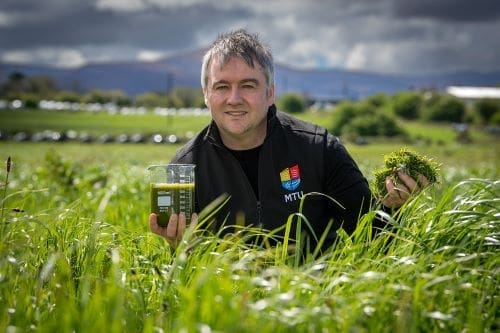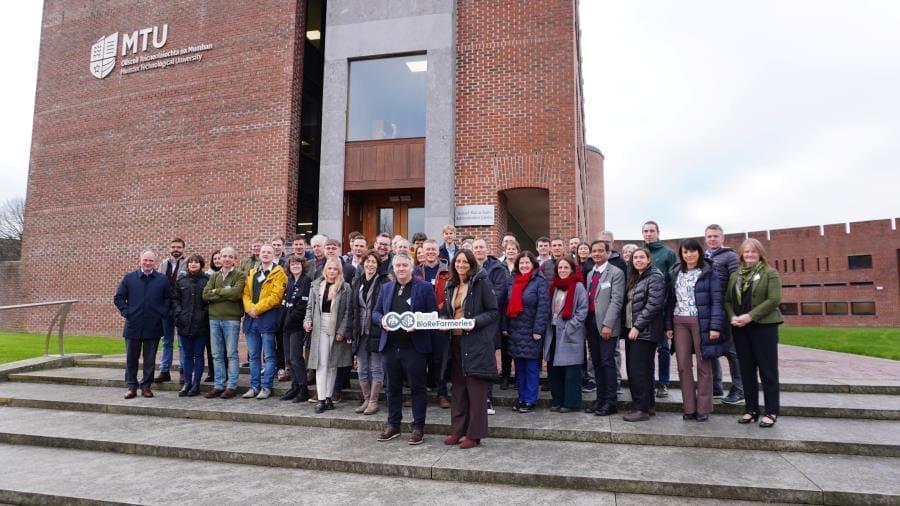A new initiative, the Rural BioReFarmeries (RBRF) project, is set to revolutionize the bioeconomy in Europe by focusing on green biorefineries powered by grasslands.
Funded by the Circular Bio-Based Europe Joint Undertaking (CBE JU), the €8.7 million project kicked off on December 10 at Munster Technological University (MTU) in Cork, Ireland. Over the next four years, MTU will lead the initiative in collaboration with 18 other partners from eight European countries. The project aims to optimize regional biorefineries and demonstrate how the bioeconomy can directly benefit farms and rural communities.

Grasslands make up nearly 35% of agricultural land in Europe, with Ireland alone having over 90% of its agricultural land covered by grass. The RBRF project will unlock new bioeconomy opportunities by introducing and scaling technologies that allow farmers to derive economic, environmental, and social benefits from grasslands. The project is designed to help farmers generate high-value ingredients from grass, complementing traditional farming operations and boosting rural economies.
The main objective of RBRF is to develop two green biorefinery and anaerobic digestion demonstration sites in Ireland and Denmark. These sites will work alongside research and industrial partners in the Netherlands, Ireland, Denmark, and Poland to optimize the conversion of grass, clover, and green biomass residues from local farms.
This process will co-produce a variety of value-added products, including human and animal-grade proteins, bio-based food packaging, flavors, anti-microbials, feed additives, fertilizers, and energy.
“In a circular bioeconomy, we can produce not only forage, but also food, high-value materials, and energy from grasslands,” says James Gaffey, Project Coordinator and Co-director of the Circular Bioeconomy Research Group (CIRCBIO) at MTU. “Green biorefineries are a key sustainable technology for realizing this potential. Rural BioReFarmeries will help grassland farms become more self-sufficient by creating essential farm inputs like feed, fertilizers, and energy, while co-producing additional food, monogastric feed concentrates, and high-value ingredients from their grass and farm residues. In doing so, the project will help farms reduce input costs, create new revenue streams, and support them in meeting climate targets, while benefiting the local agricultural sector and broader society.”
Luisa Mascia, Project Officer at CBE JU, further highlights the strategic importance of the initiative: “The Rural BioReFarmeries project kicks off with more than €8 million in CBE JU funding to unlock the untapped potential of grass biomass. Two small-scale biorefineries, in Ireland and Denmark, will deploy farmer-centered grass-based value chains, offering new circular business models that are fully replicable across rural areas and regions in Europe. The project will boost rural resilience, diversify income for farmers, and reduce emissions in the agri-food sector. Rural BioReFarmeries marks a new milestone for Europe’s circular bioeconomy, highlighting the strategic value of grassland valorization.”
***
The initiative is supported by CBE JU, a €2 billion partnership between the European Union and the Bio-based Industries Consortium (BIC), which funds projects advancing competitive circular bio-based industries under Horizon Europe, the EU’s research and innovation program.
About the Rural BioReFarmeries Consortium
Rural BioReFarmeries brings together 19 partners from 8 countries (Ireland, Denmark, Netherlands, Bulgaria, Italy, Greece, Poland and Estonia). The full consortium is made out of a multidisciplinary team involving academia, commercial entities and farmer representatives, including: Munster Technological University, Aarhus University, Carbery Group, University College Dublin, NuaFund, ODOS, Barryroe Cooperative, FarmB, Wageningen University, Carhue Piggeries, SEGES Innovation, PaperFoam, Alganed, Poznan University of Technology, Agricultural University of Plovdiv, Unitelma Sapienza of Rome, AUSTRALO, University of Galway and Trinity College Dublin.
Article Source:
Press Release/Material by Rural BioReFarmeries Project | MTU
Featured image credit: MTU




